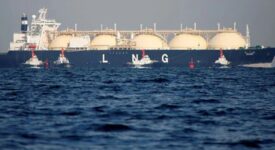The crisis highlights the need for a robust fuel supply and contingency planning.
There has been a recent report of a fuel shortage in Pakistan, which has troubled many people, especially in Punjab.
The administration blames hoarding for the problem, which was brought on by rumors that pump prices would significantly rise.
The fuel crisis, however, offers a chance to bring about a radical transformation and increase the nation’s energy security for a more secure and stable future.
There are currently 29 days’ worth of diesel and 21 days’ worth of gasoline reserves in the nation, indicating that there isn’t a real fuel crisis at the moment. Yet, the situation is not perfect right now. Refineries frequently stop operating, and PSO just had an oil shipment canceled.
The reason for these issues is the nation’s declining foreign exchange reserves, which recently fell to a nine-year low of around $3 billion, barely enough to pay a month’s worth of imports. Since the nation spends about $1.3 billion each month on obtaining crude oil and fuels from international markets, this gives rise to serious concerns for the nation.
Hence, the current fuel shortage—however artificial—serves as a warning of unfavorable events that might occur if authorities do not act and the business environment worsens further.

The most recent incident serves as further proof of how crucial a role regulators must play. Proactive steps should be taken to avoid crises rather than waiting for them to develop.
The current issue also highlights the significance of maintaining enough fuel supplies and making early plans for unforeseen events.
There is no doubt that oil companies are having trouble supplying customers with enough oil promptly. These businesses have been complaining for months about the restrictions on settling Letters of Credit (LCs) for imports of crude oil and petroleum products.
To stop the loss of foreign exchange reserves, the government severely restricted imports, although this had a significant negative impact on all businesses, particularly the petroleum industry.
Yet, a deal between Pakistan and the IMF for the delivery of $1.1 billion in financial help may be getting closer. Given that support from various nations is also reliant on the IMF agreement, this might significantly help in increasing the foreign exchange reserves.
But, even when conditions improve and the chance of a crisis declines, policymakers must stay alert and prepared for worst-case situations.
It’s important to ask challenging questions like what will happen to fuel supplies if the nation’s foreign exchange reserves continue to decrease. How will the oil sector operate under stricter limitations on LC opening? What will happen to the petroleum industry in a worst-case scenario where the nation declares bankruptcy, and how will the scarcity of fuel affect the overall economy? A thorough investigation is necessary for these issues. Due to low levels of production from the nearby oil resources, Pakistan is significantly dependent on imports to supply its needs for gasoline, diesel, and other fuels. Simply put, the nation lacks sufficient oil reserves to satisfy domestic demand, however, every effort should be made to find new supplies.
Oil exploration and production firms like OGDCL must step up their exploratory efforts and boost their output, which has been falling. Only 20% of the demand for fuel is satisfied by the domestic oil that is provided to nearby refineries.
Refineries will continue to produce fuel after processing local crude even if banks refuse to create LCs for the import of crude oil, even though supplies will be severely constrained.
Then there is the Saudi Arabian facility for deferred oil payments, which allows for the monthly purchase of $100 million worth of crude oil. This might satisfy 20% more of the need. This indicates that Pakistan can only supply 40% of its oil needs in the worst-case scenario. This large disparity between supply and demand needs to be closed since it jeopardizes the security of the energy supply.
A significant economic crisis can have long-lasting effects that are felt by many facets of society. The rate of inflation, which is now astronomically high at 27.6%, could get substantially higher.
Businesses under pressure may fail, resulting in a decline in revenue for the entire economy, including the manufacturing, agricultural, and service sectors. This leads to a decrease in employment opportunities and a rise in poverty, which is a recipe for social instability.
The 2008 global financial crisis serves as a reminder of the potential consequences. A fuel crisis that exacerbates an already terrible situation can only make it worse.
So, even during times of crisis, policymakers should put mechanisms in place to maximize the use of local oil refineries. To diversify and ensure adequate supply, this may entail enlarging the Saudi Arabian deferred oil payment program or concluding government-to-government arrangements with other oil-producing countries.
To purchase crude oil and processed petroleum products at a significant discount, the government has been actively negotiating a deal with Russia. Yet obtaining cheap oil shouldn’t be the only goal; the energy supply system should also be strengthened.
The current gasoline crisis offers an opportunity to improve energy security. The petroleum sector as a whole should be strengthened by policymakers to support the oil refining sector. The nation can be made more robust by lowering the local energy market’s susceptibility to both internal and foreign shocks. Instead of seeing this catastrophe as a waste, we can see it as a chance to bring about improvement.








